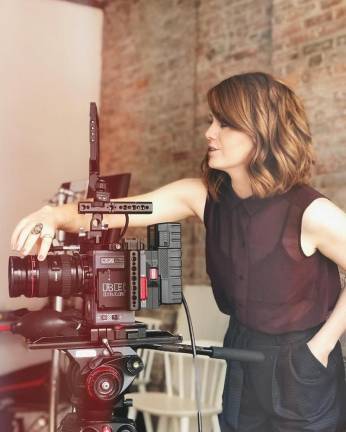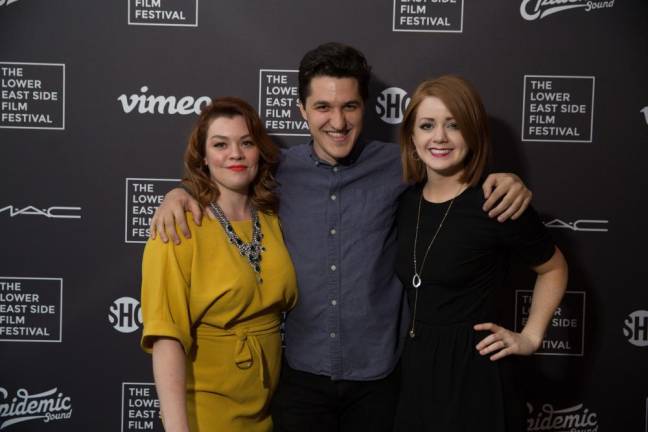Cinema in a Time of COVID
Co-founder of the Lower East Side Film Festival on the importance of supporting indie filmmakers


With humble beginnings in a pop-up space with 30 folding chairs and a pull-down projector screen, the Lower East Side Film Festival grew to be hosted in iconic venues like the Crosby Street Hotel, Soho House and Sunshine Cinema. Although the COVID pandemic halted in-person festivities, which have included pool parties, drive-in theaters, stilt walkers and firebreathers, audiences can still stream all 37 films from home until June 29.
“We have a lot of great filmmakers and a lot of great films that were part of our program that we’d already worked on and we didn’t want to let them down,” said festival director and co-founder Roxy Hunt. The 33-year-old East Village resident explained that the LESFF was born out of a need to give up-and-coming independent filmmakers working with modest budgets a chance to showcase their work.
Throughout its 10-year history, they’ve celebrated hundreds of new short and features films, with help from a star-studded lineup of judges like Ethan Hawke, Susan Sarandon, Rami Malek and Rosario Dawson. This year’s focus is on recognizing first and second-generation American filmmakers, and features judges like Indya Moore, from FX’s “Pose,” and Samantha Bee from “Full Frontal with Samantha Bee.”
Hunt’s husband, Tony Castle, also serves as co-founder and festival director. Both Colorado natives, the couple moved to New York in 2009 and launched a film production company out of Williamsburg, BFD Productions.
Tell us how the festival first came about.
The idea came from my fellow festival directors, Shannon Walker and Damon Cardasis, who had made a feature mockumentary for less than $10,000. They were not seeing many places for films like that to be exhibited, because there weren’t many festivals that would take on such low-budget films. It was created out of the need for micro low budget films to have a festival to call their own. It was in a pop-up space on Norfolk Street. It was just a little store front and had 30 folding chairs and a pull-down projector screen. We had a popcorn machine in the back. It was BYOB. We did it for almost an entire month; every single night it sold out. It created a really intimate environment. Our audience was forced to sit right next to each other and the filmmakers were right there too. It created an interesting vibe that we didn’t see at other film festivals before.
You’ve hosted a drive-in movie theater and a rooftop pool party. Tell us how you put those together.
For the drive-in movie theater, we took over a parking lot on the Lower East Side. New Yorkers don’t generally have cars very often, so we partnered with Zipcar, and they provided a bunch of Mini Cooper convertibles. We had the parking lot lined with those and folks could rent out the car as their seats for the theater, essentially. We projected on a building and had some food trucks and some performers and some DJs in the back of a pickup truck. It was really fun. We held the pool party at a hotel, Sixty LES, in their pool. Again, we projected on a wall that’s adjacent to the pool. People were floating in the pool while watching the films.
Give us a glimpse into this year’s film collection.
We did a direct ask of filmmakers if they identified as immigrant or first generation, so we have a number of different folks who identified themselves that way. Those films are across the whole festival, but there’s one night that features a little bit more specifically, which is our “This is America” short showcase, which is just a number of great short films, different slices of American culture. We have an “I Love New York” shorts; that’s always very popular with our audience. “Mindf**k” shorts is one of the things we’re known for; people come back for that year after year, just very crazy, experimental-type, messed-up films, but in a good way. We have a showcase called, “Me, Myself and I,” which is films about self-reflection, growth and coming of age. We try to make sure there’s something for everybody. And if you’re not a huge cinephile, it’s still approachable and you can figure out from the schedule what you might be interested in.
One of the industry panels is with Ramy Youssef, who just won the Golden Globe for his Hulu show.
We partnered with the Writers Guild of America East; we partner with them every year to host some industry talks. This year, it’s “Inside the Writer’s Room” of “Ramy” for the second season, so it’s him and a number of different writers from his writer’s room. It’s moderated by Rowaida Abdelaziz from Huffington Post, who’s a great journalist who focuses a lot on covering Islamophobia and social justice issues. We talked a lot about different representations of Muslims on TV and in the media and the role that Ramy plays in all of that.
You just established an Emerging Filmmakers Program with an emphasis on BIPOC filmmakers.
With the current movement and sweeping calls for systemic changes in cultural structures and institutions, especially in New York City, we felt like we needed to take a look at ourselves and our programming and really acknowledge that a lot of times people of color have more financial barriers to get into the festival circuit than anyone else. We are hoping we can help films that are already basically made, sometimes it’s the end of the line and you run out of funds, and you can’t get that final sound mix or color or pay submission fees for festivals. And we’ve seen so many filmmakers face those problems and ask us for fee waivers and we help out when we can, but we really want to try to focus on getting those films to the finish line and removing some of those barriers, specifically for BIPOC filmmakers.